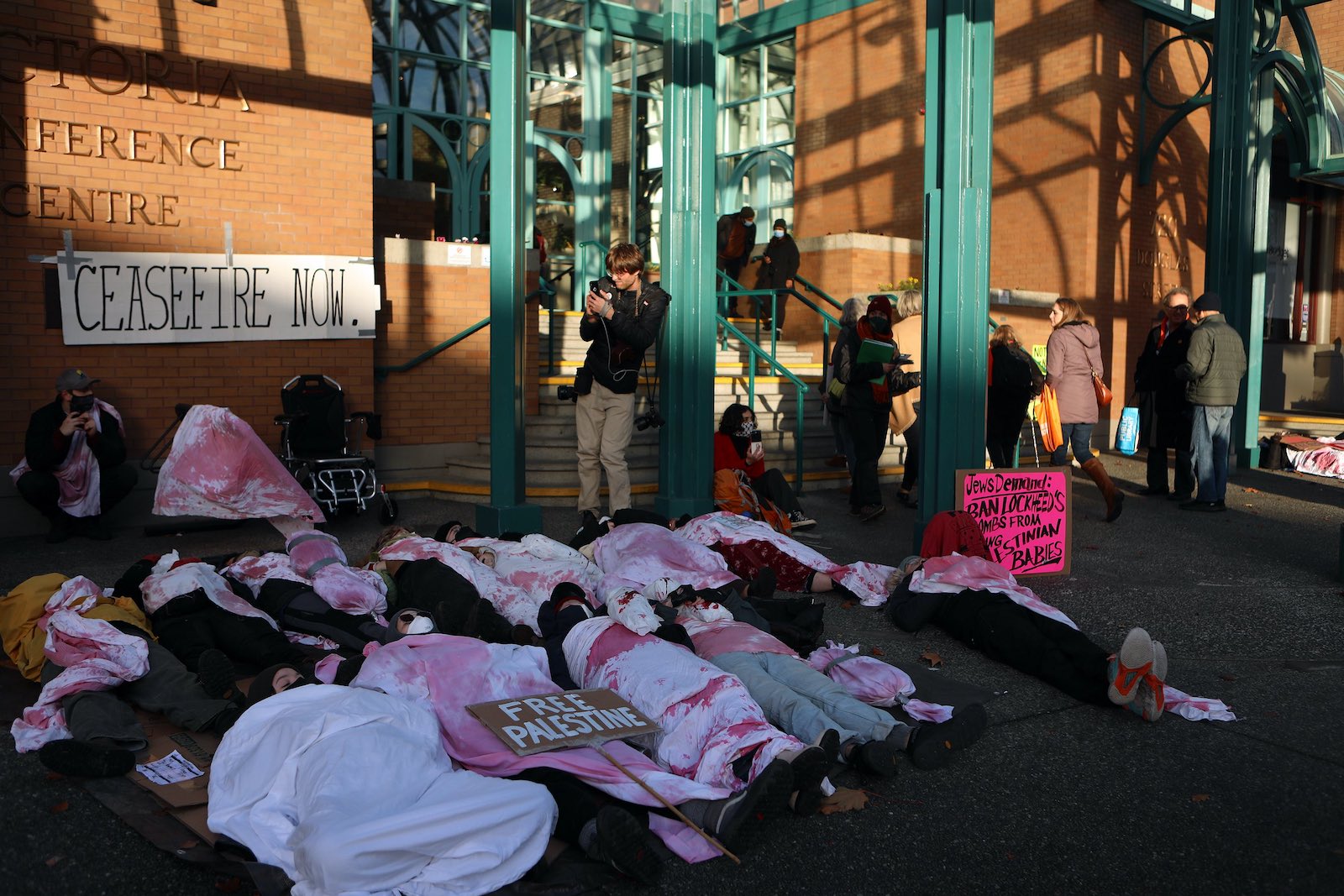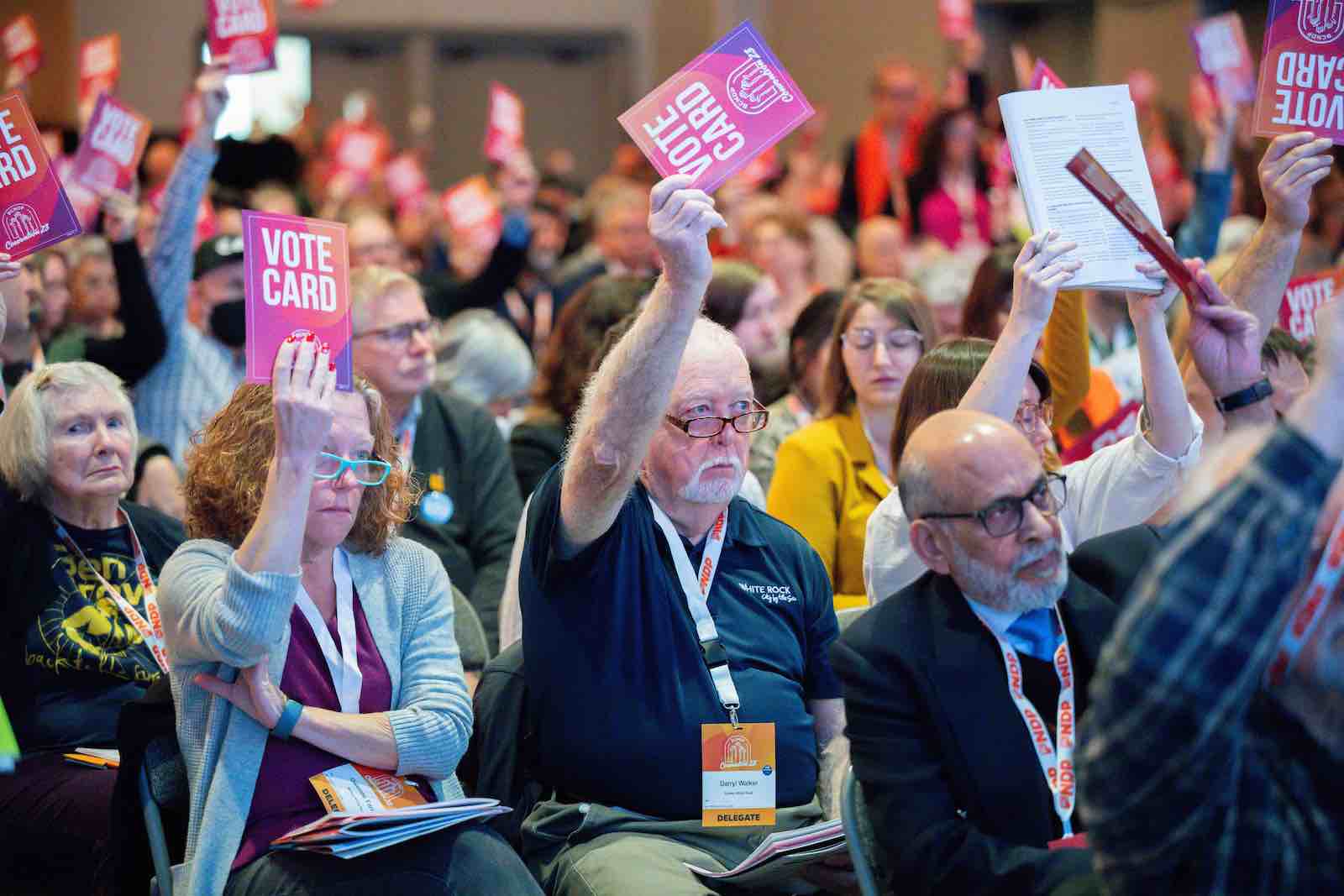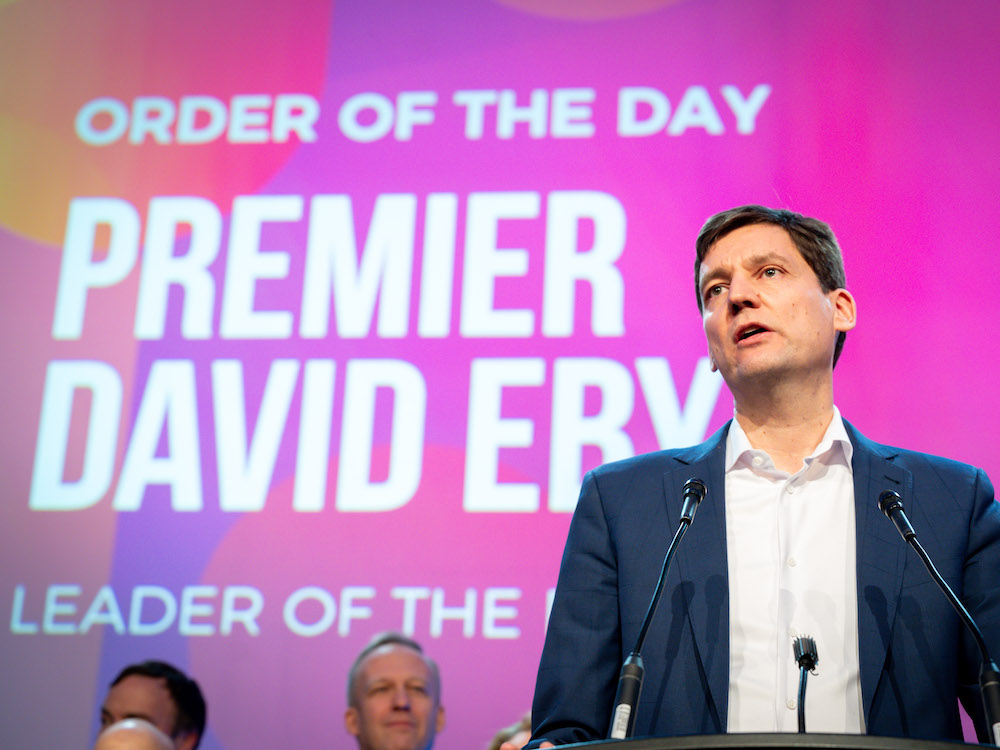The last resolution to pass at the BC NDP’s convention Sunday urged the Canadian government to call for an immediate ceasefire in the fight between Hamas and Israel.
The emergency resolution, added late to the agenda, called the attacks by Hamas on Oct. 7 “indefensible” and committed the BC NDP to “condemn the deaths of thousands of innocent civilians, caused by both Hamas terrorist attacks and Israeli military strikes.”
It called for the release of hostages taken by Hamas, for the Canadian government to advocate for urgent access for humanitarian aid in Gaza and for the B.C. government to welcome refugees from the region to the province.
The resolution echoed language from the United Nations calling the situation in Gaza a “humanitarian catastrophe” and said “innocent Israelis and Palestinians caught in the fight between Hamas and Israel have a right to peace and security.”
On a day when protesters outside the Victoria convention centre called for a ceasefire, the motion attracted long lineups of speakers, most of whom did not get a chance to speak, and used the entire 22 minutes set aside for emergency resolutions.
Sharon Goldberg, who identified herself as an anti-Zionist Jew and a member of Independent Jewish Voices, spoke against the resolution, saying it didn’t go far enough. We are witnessing genocide, she said, and “we need to do whatever we can to stop it.”
Amir Bajehkian, a delegate from the Vancouver-Little Mountain riding of Canadian-Iranian descent, talked about a refugee camp with four toilets for 50,000 people and water supply for four hours a day. “This is about losing hope,” he said, adding that he is not Palestinian but did grow up under an Islamist dictatorship. “When a people lose hope, hate and terror thrives.”
Mable Elmore, the MLA for Vancouver-Kensington, talked about the need to reach out with love, embrace justice and fight against both antisemitic and Islamophobic hate.
Hamas militants killed some 1,200 people and took more than 240 hostages in the Oct. 7 attack, according to the Israeli government.
In response Israel has bombed Gaza and cut off almost all supplies and aid to the home of about 2.3 million Palestinians. As of last week, more than 11,200 people had been killed, according to health officials in Gaza.
While dozens of B.C. local government elected officials have called for a ceasefire, along with the United Nations and many governments around the world, Canadian Prime Minister Justin Trudeau and B.C. Premier David Eby have declined to join the call.

Eby has said that he wants peace in the Middle East, but his responsibility as premier is to the people of B.C. and addressing the rise in hate seen here since the Oct. 7 attack.
The NDP resolution, which had been composed from several related motions, passed with near unanimity.
A quiet weekend from the green wing
There was little evidence at the convention, attended by 741 delegates, of the BC NDP’s environmental wing that a year ago challenged for the leadership of the party.
Eby won the leadership and became premier only after the party’s provincial executive rejected Anjali Appadurai’s candidacy after the party’s chief electoral officer, Elizabeth Cull, recommended she be disqualified.
Cull’s main concern was that the Appadurai campaign had improperly co-ordinated with third parties, particularly the environmental groups Dogwood and 350.org, to sign up new members.
While some observers thought the thousands of new members could stay and involve themselves in the party — with the numbers to change party policy, elect party executives, select candidates and vote for a leadership change — they seem to have all but disappeared.
Instead the critical environmental voices were outside the convention centre, with an alliance identifying as Frack Free BC greeting arriving delegates both Friday evening and Saturday morning.
A press release from the alliance quoted Ashley Zarbatany, chair of the NDP’s standing committee on environment and economy. “There is a critical mass of public and political opposition to the continued expansion of fossil fuel extraction while the world burns, and it’s reaching a tipping point,” she said, adding that the government needs to stand up to the big oil and gas companies fuelling the climate crisis. “Fracking has become a political issue that the B.C. government must fix.”
The release also quoted Grand Chief Stewart Phillip, president of the Union of BC Indian Chiefs and husband of NDP MLA Joan Phillip, who was recently elected in a byelection in Vancouver-Mount Pleasant.
“The continued expansion of the gas industry and associated fracking is unconscionable when we consider how this will impact the lands and waters in this province and the global climate,” he said. “We must be consistent and proactive in our approach to climate change and ground our collective solutions in the rights of Indigenous Peoples, including the right to free, prior and informed consent.”

Related resolutions, however, didn’t make it to the convention floor, though there was support for accelerating climate action and supporting green jobs.
Most tellingly, there was no challenge to Eby’s leadership.
On Friday evening a delegate tried to amend the agenda to add a half-hour discussion of Eby’s performance before the vote on his continued leadership. When a speaker mentioned it would be an opportunity to discuss how Eby became premier, it got a spattering of applause. The motion was voted down with near unanimity.
When results were announced Saturday, there was solid support for Eby to continue as leader, with 93 per cent of delegates voting against having a leadership vote at this time.
Orange-diaper baby
When it was Eby’s time to talk to the convention on Saturday, he was introduced by his wife, Cailey Lynch, a Vancouver family doctor who upstaged her husband with a humorous speech that broke the news she is pregnant with the couple’s third child.
“The baby was planned and this is not why contraception is free in B.C. now,” said Lynch, who is due in June.
Talking to reporters later, Eby said, “It’s incredibly exciting news for our family,” and that it would be a busy time for him and his family, only so much of which can be planned for.
In his speech Eby talked about the choice voters will have in the election scheduled for Oct. 19. He reminded delegates of BC United Leader Kevin Falcon’s time in office as a BC Liberal cabinet minister under premiers Gordon Campbell and Christy Clark.
Falcon was part of a government that prioritized tax breaks for the wealthy and had the country’s lowest minimum wage, tolls on bridges and high costs for child care, Eby said. “He still stands for those at the top.”
Falcon would do the same things again, Eby said to a standing ovation, but “We won’t let him.”
In contrast, Eby said, after six years of NDP government the province has the highest minimum wage in the country, paid sick days, recognition for professional credentials from other countries and an easier path to forming a union and joining the middle class.
The NDP government eliminated MSP premiums, he said, calling it “the largest middle-class tax cut in a generation.” The party also made the United Nations Declaration on the Rights of Indigenous Peoples provincial law, pursued a court case against opioid makers, cut child-care costs and got rid of bridge tolls, he said.
‘Stand strong’ on carbon tax
During his speech, Eby cited recent climate disasters in B.C. and said the province remains committed to the carbon tax. “If the rest of the country abandons the fight against climate change, we will stand strong, because we know what the costs are in this province,” he said. “While others falter, we will stand strong.”
The federal government recently removed the carbon tax from home heating oil, a fuel used mainly in Atlantic Canada. The change does not apply in B.C., which has its own carbon tax that predates the federal one.
The NDP has been under pressure from BC United to remove the province’s carbon tax from home heating fuels, and Falcon has said that if he becomes premier and is given the chance, he would eliminate the carbon tax that he helped introduce.
Eby called the federal change “ham-handed” and confirmed to reporters that the provincial government will keep the provincial carbon tax on home heating fuels.
“We don’t want to do what the federal government did, which is protect certain kinds of heating, because we really do want people to have a choice to switch to a zero-carbon heating and cooling solution like a heat pump and they do work across the province,” he said.
The province protects people with climate action rebate cheques that give many families back more than they spend on the carbon tax, he said.
Asked about the anti-fracking protest, Eby said, “One of the beauties of the base of the NDP is they have very high ideals about how things should work, how government should work, and they are profoundly concerned about the issues of our time.”
They will continue to push the party and the government to do more on climate change and other issues, he said. “That’s why our party is strong and that’s why I think we’re in government, because we have members who always ask us to do better. We’re going to keep working on all the issues they care about and all the issues British Columbians care about.”
Plecas joins NDP
One first-time delegate was Darryl Plecas, a BC Liberal MLA until 2017 when he became an Independent in the legislature and took the role of Speaker, allowing the NDP to form government with the support of the then three BC Green Party MLAs.
Plecas said he had joined the NDP six months ago after hearing Eby speak and liking what he heard. He finds the party sincere and believes it has shown the guts to take tough steps, even when they may not be politically popular.
“I believe in good governance, and that’s what they’re delivering,” said Plecas, stressing his background as an academic who came to politics with more interest in policy than in power.
Following Eby’s speech, Plecas came by grinning and said, “I rest my case.”
Healthy finances
Party treasurer Jaime Matten gave a report saying the party has been hitting its financial targets “quarter after quarter after quarter” and is on solid ground to fight the next two elections.
“For a number of years we struggled with debt,” Matten said, referring to the difficulties the party had raising money while in opposition that had the party “downing tools” between elections.
After the 2017 election, with support from Green MLAs, the NDP minority government passed a bill that capped donations from individuals and banned donations from corporations and unions. The party adapted well, Matten said, and was able to invest in the 2020 snap election and remain prepared for the next one.
It is now on track to run a fully funded central campaign as well as fully funded local campaigns in battleground constituencies, she said. It expects to take on about $1 million in debt for the 2024 election, which it will be able to pay off with the public funding it will get back after election day.
The party holds conventions every two years. The last one was held virtually due to the COVID-19 pandemic, so this past weekend’s was the first to be in-person since 2019.
It was the first convention since Eby became leader and the last convention before the election scheduled for next October.
Sussanne Skidmore, president of the BC Federation of Labour and an official for both provincial and federal parties, said in a brief speech that despite occasional differences with the government, labour will work “to make sure there’s a government in B.C. that working people know is on their side.”
Members defeated a motion to raise the membership fee to $20 from the current $10, with speakers arguing the party should do everything it can to avoid being elitist and to encourage new members to join.
NDP president Aaron Sumexheltza, who was re-elected to a second term during the convention, set the tone on Friday night, warning that BC United and the Conservative Party of BC would be fighting “tooth and nail” to undo the government’s work.
He thanked former premier John Horgan, noting to much applause that “nothing we’ve accomplished these last eight years could have been accomplished without his leadership.”
Sumexheltza recognized that it was Eby’s first convention as leader and that it was necessary to continue “to turn the page on 16 years of BC Liberal neglect.”
On Saturday morning, Sumexheltza reminded delegates of some of the party’s accomplishments in government — getting big money out of politics, eliminating MSP premiums, making birth control free and eliminating the interest on student loans.
But he had a warning for delegates: “We can’t take anything for granted. It’s up to us to protect our progress.” ![]()
Read more: Rights + Justice, BC Politics

















Tyee Commenting Guidelines
Comments that violate guidelines risk being deleted, and violations may result in a temporary or permanent user ban. Maintain the spirit of good conversation to stay in the discussion and be patient with moderators. Comments are reviewed regularly but not in real time.
Do:
Do not: